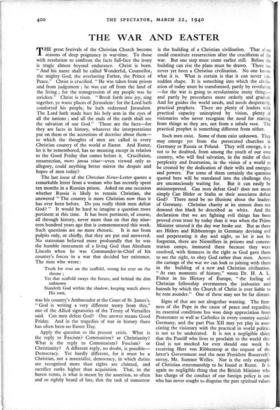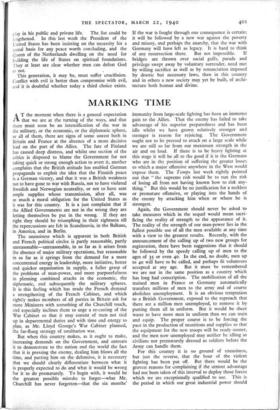THE WAR AND EASTER
T HE great festivals of the Christian Church become seasons of deep poignancy in war-time. To those with resolution to confront the facts full-face the irony is tragic almost beyond endurance. Christ is born. " And his name shall be called Wonderful, Counsellor, the mighty God, the everlasting Father, the Prince of Peace." Christ is crucified. " He was taken from prison and from judgement ; he was cut off from the land of the living ; for the transgression of my people was he stricken." Christ is risen. " Break forth into joy, sing together, ye waste places of Jerusalem : for the Lord hath comforted his people, he hath redeemed Jerusalem. The Lord hath made bare his holy arm in the eyes of all the nations ; and all the ends of the earth shall see the salvation of our God." Those are the facts—for they are facts in history, whatever the interpretations put on them or the accretions of doctrine about them— to which the thoughts of men are called in every Christian country of the world at Easter. And Easter, let it be remembered, has no meaning except in relation to the Good Friday that comes before it. Crucifixion, resurrection, mors janua vitae—even viewed only as allegory, could anything better mirror the despair and hopes of men today?
The last issue of the Christian News-Letter quotes a remarkable letter from a woman who has recently spent ten months in a Russian prison. Asked on one occasion whether Russia is likely to remain Christian, she answered " The country is more Christian now than it has ever been before. Do you really think men defeat God? " It would be hard to imagine a question more pertinent at this time. It has been pertinent, of course, all through history, never more than on that day nine- teen hundred years ago that is commemorated this week. Such questions are no mere rhetoric. It is not from pulpits only, or chiefly, that they are put and answered. No statesman believed more profoundly that he was the humble instrument of a living God than Abraham Lincoln when he was Commander-in-Chief of his country's forces in a war that decided her existence. The man who wrote :
Truth for ever on the scaffold, wrong for ever on the throne ; Yet that scaffold sways the future, and behind the dim unknown Standeth God within the shadow, keeping watch above His own, was his country's Ambassador at the Court of St. James's. " God is writing a very different treaty from this," one of the Allied signatories of the Treaty of Versailles said. Can men defeat God? One answer means Good Friday. And in the tragedies of war in history there has often been no Easter Day.
Apply the question to the present crisis. What is the reply to Fascism? Communism? or Christianity? What is the reply to Communism? Fascism? or Christianity? A different reply, no doubt, is possible— Democracy. Yet hardly different, for it must be a Christian, not a materialist, democracy, in which duties are recognised more than rights are claimed, and sacrifice ranks higher than acquisition. That, in the barest terms, is what is meant by the assertion, so often and so rightly heard of late, that the task of tomorrow is the building of a Christian civilisation. That ahne could constitute resurrection after the crucifixion of the war. But one step must come earlier still. Before the building can rise the plans must be drawn. There has never yet been a Christian civilisation. No one knows what it is. What is certain is that it can never take sudden shape. It is something into which the civilis- ation of today must be transformed, partly by revolution —for the war is going to revolutionise many things— and partly by procedures more orderly and gradual. And for guides the world needs, and needs desperately, practical prophets. There are plenty of leaders with practical capacity uninspired by vision, plenty of visionaries who never recognise the need for starting from things as they are, not from a tabula rasa. The practical prophet is something different from either.
Such men exist. Some of them exist unknown. They may emerge yet from the persecuted churches in Germany or Russia or Poland. They will emerge, it is not to be doubted, from among the youth of our own country, who will find salvation, in the midst of their perplexity and frustration, in the vision of a world to be created by the dedication of their wills and energies and powers. For some of them certainly the question quoted here will be translated into the challenge they are unconsciously waiting for. But it can easily be misinterpreted. Can men defeat God? does not mean simply Can Hitler or Stalin or their associates defeat God? There need be no illusions about the leaders of Germany. Christian charity at its utmost does not demand that black be described as white. And the declaration that we are fighting evil things has been proved even truer by today than it was when the Prime Minister uttered it the day war broke out. But as there are Hitlers and Ribbentrops in Germany devising evil and perpetrating it day and night, so let it not be forgotten, there are Niemollers in prisons and concen- tration camps, immured there because they were resolved, with firmness in the right as God gave them to see the right, to obey God rather than men. Across the carnage of the war we can look to joining with them in the building of a new and Christian civilisation. " At rare moments of history," wrote Dr. H. A. L. Fisher in his History of Europe, " the feeling of Christian fellowship overmasters the jealousies and hatreds by which the Church of Christ is ever liable to be rent asunder." One of these may not be far distant.
Signs of that are not altogether wanting. The firm- ness of the Pope in the cause of peace and regarding its essential conditions has won deep appreciation from Protestants as well as Catholics in every country outside Germany, and the part Pius XII may yet play in asso- ciating the visionary with the practical in world politics is not to be underrated. It is not a negligible thins: that the Pontiff who lives to proclaim to the world that God is not mocked for ever should one week be receiving Herr von Ribbentrop at the • request of the latter's Government and the next President Roosevelt'', envoy, Mr. Sumner Welles. Nor is the only example of Christian statesmanship to be found at Rome. It again no negligible thing that the British Minister who has charge of the conduct of our foreign policy is one who has never sought to disguise the part spiritual values
play in his public and private life. The list could be lengthened. In this last week the President of the United States has been insisting on the necessity for a moral basis for any peace worth concluding, and the Queen of the Netherlands dwelling on the need for building the life of States on spiritual foundations. They at least are clear whether men can defeat God or not.
This generation, it may be, must suffer crucifixion. Conflict with evil is better than compromise with evil, and it is doubtful whether today a third choice exists. If the war is fought through one consequence is certain; it will be followed by a new war against the poverty and misery, and perhaps the anarchy, that the war with Germany will have left as legacy. It is hard to think of any resurrection there. But not impossible. If bridges are thrown over social gulfs, parade and privilege swept away by voluntary surrender, need met by willing sacrifice as well as by renunciation imposed by drastic but necessary laws, then in this country and in others a new society may yet be built, of archi- tecture both human and divine.







































 Previous page
Previous page